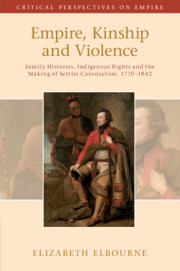 Empire, Kinship and Violence
Empire, Kinship and Violence Book contents
- Empire, Kinship and Violence
- Critical Perspectives on Empire
- Empire, Kinship and Violence
- Copyright page
- Contents
- Figures
- Maps
- Acknowledgements
- A Note on Nomenclature
- Abbreviations
- Introduction
- Part I North America
- Part II Upper Canada, New South Wales, Van Diemen’s Land, Victoria, Western Australia, the Cape Colony, Sierra Leone
- 4 Upper Canada
- 5 New South Wales
- 6 Southern Africa
- 7 From Sierra Leone to Swan River
- Part III Britain, the Cape Colony, West Africa
- Bibliography
- Index
5 - New South Wales
Frontier Violence and the ‘Rule of British Law’
from Part II - Upper Canada, New South Wales, Van Diemen’s Land, Victoria, Western Australia, the Cape Colony, Sierra Leone
Published online by Cambridge University Press: 15 December 2022
- Empire, Kinship and Violence
- Critical Perspectives on Empire
- Empire, Kinship and Violence
- Copyright page
- Contents
- Figures
- Maps
- Acknowledgements
- A Note on Nomenclature
- Abbreviations
- Introduction
- Part I North America
- Part II Upper Canada, New South Wales, Van Diemen’s Land, Victoria, Western Australia, the Cape Colony, Sierra Leone
- 4 Upper Canada
- 5 New South Wales
- 6 Southern Africa
- 7 From Sierra Leone to Swan River
- Part III Britain, the Cape Colony, West Africa
- Bibliography
- Index
Summary
Saxe Bannister was appointed Attorney General of New South Wales probably at least in part because his interactions with the Six Nations had brought him to the attention of the Colonial Office. He found himself plunged into conflict with competing settler factions. The chapter focuses primarily, however, on his interaction with Indigenous resistance, particularly by the Wiradjuri, in the context of the violent conquest of Australia. Bannister tried to apply the British rule of law as he saw it to frontier contexts, calling for the declaration of martial law during warfare in both Bathurst and Hunter Valley. He also tried unsuccessfully to prosecute police officers and local settlers for extrajudicial murders. Bannister left New South Wales in disgrace but his legal legacy persisted in debates that had implications across the British settler empire: the court case would later lay the groundwork for the legal refusal of Indigenous sovereignty in exchange for the protection of Indigenous people against settler violence. The chapter highlights the importance and the contradictions of the British ideology of the rule of law.
- Type
- Chapter
- Information
- Empire, Kinship and ViolenceFamily Histories, Indigenous Rights and the Making of Settler Colonialism, 1770-1842, pp. 189 - 231Publisher: Cambridge University PressPrint publication year: 2022
